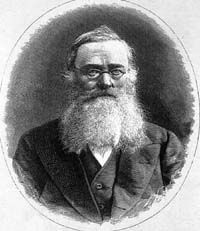Mykola Kostomarov’s Four Behests

May 16 marked the 185th anniversary of the birth of Mykola Kostomarov (1817-85), distinguished Ukrainian and Russian historian, writer, ethnographer, and public figure. It is worth recalling his remarkably rich creative heritage not only because of the “half-jubilee” date, but also because his ideas and behests remain relevant, as one can easily see for oneself.
Behest One. At a time when the history of the state (rather of the ruling dynasty and a particular monarch) was habitually identified with the history of the whole people (e.g., during Karamzin’s lifetime), Kostomarov’s thesis that “the people is the ultimate beginning of the forms of public and political life being studied by history” came as a remarkably refreshing and innovative concept. He laid the foundations of the populist school in Ukrainian historiography. Now we can say that yes, there are more or less lengthy periods in history when the people keeps silent, but this is a temporary phenomenon.
Behest Two. All his life Kostomarov displayed a reverent and extremely responsible attitude toward the scholar’s professional duty. To him, science always remained “a subject I love passionately.” He loathed approximation and ambiguity, so all his papers rested on a voluminous documentary basis and decades of Herculean archival quest.
Behest Three, as important. As a prominent historian versed in both Russia and Ukraine, he treated both peoples with utmost respect, leaving behind a subtle and deep- analysis of their respective national characters. He believed that the Ukrainian bent on personal freedom prompted our people to build appropriate social structures (the Zaporozhzhian Sich in the past and probably a federation in the future), while the Russians “sought a powerful communal body relying on the age-old principles, resulting in a formidable autocracy.”
Finally, his ideas were incorporated into, and essentially relied upon, the Brotherhood of Sts. Cyril and Methodius (he was among its founders), particularly that “every ethnic group retains its special features combined with a common devotion to personal and social freedom; while loathing religious and ethnic hatred, we condole with the ignorance of the masses.”
A brilliant historian and stylist, he knew how to make an exciting story of past dramatic events, making it a gothic novel. He wrote historical fiction based on keen scholarly knowledge. Mykola Kostomarov was and remains a master of thought, a coryphaeus of our thought, our word, and culture.”






